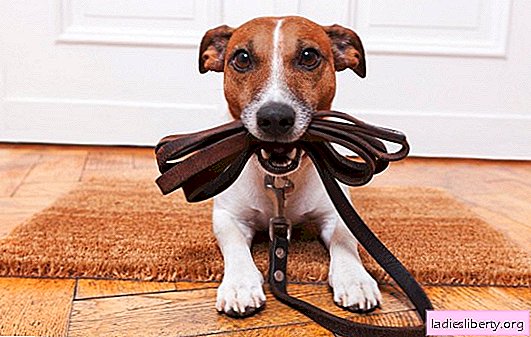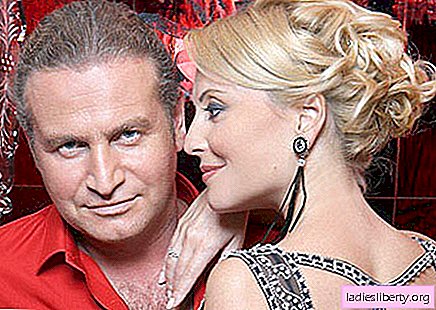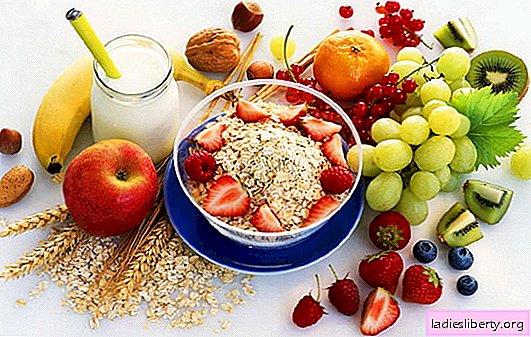
Puppies are small lumps of happiness that require close attention to themselves and proper care. Your puppy is only a month old - does it need to be raised at such an early age, and how to do it right?
Despite the rather young age of the pet, right now you should start to actively engage with it, in the near future to grow up a healthy, smart and devoted friend for you and your family.
Parenting and health of a monthly puppy
First of all, if you set yourself the goal of properly raising your puppy, you must show it to the veterinarian. The doctor assesses the health status of the baby and weighs it. After evaluating the veterinarian, your puppy may receive his first vaccine, but his immune system is still fragile.
It is necessary to monitor its weight daily, especially during the process of excommunication from the mother, in order to understand how solid and good the solid food is absorbed by his body. At the age of 1 month, there should be no instant excommunication from mother's milk, the transition to another food should be done gradually, in order to avoid health problems. Seek immediate medical attention if your puppy seems anemic, stops eating and / or experiences constant diarrhea or vomiting.
An important part of puppy care is protection against worms and fleas. It is necessary to observe a certain schedule in carrying out both procedures. So, about a week before the deworming is necessary to rid your pet of fleas. It is worth mentioning the preparation for vaccinations: one and a half to two weeks before vaccination, it is necessary to deworm the puppy. The procedure must be performed so that the baby's body is not weakened by worms and is ready to fight the infection. The time frame for deworming is determined by the veterinarian. Usually the first preventive procedure takes place at the age of 2-3 weeks, then it is repeated at 4, 8, 12 weeks. The subsequent schedule of prevention will tell you the veterinarian.
Nutrition - the basis for proper puppy education
When the puppy is only one month old, the wrong and cruel decision when raising a baby will be a sharp weaning from the mother’s breast. In the fourth week, milk teeth begin to appear in the puppies, and the mother gradually begins to excommunicate them herself.
In case the pet cannot get enough milk from its mother or is orphaned, it is necessary to introduce complementary foods with a special mixture from a bottle or very thin porridge from dry puppy food soaked in milk. When introducing feed, you must carefully follow the instructions on the label to correctly calculate the amount of pet food needed. Gradually, over several weeks, milk should be replaced with water, and then reduce the amount of water in the porridge so that by 2 months the puppy switched to dry food. Feeding babies up to a year is 4-6 times a day, but closer to the year the number of feeds is brought up to 1-2 times a day.
During the next feeding from the bottle, you can try to interest the puppy with solid food, diluting a piece of food with water until soft. Invite the puppy to lick the feed from your finger. Let him at first play more with food than he eat, make sure that he really ate the food. As soon as he begins to fully eat solid food, bottle feeding should be discontinued.
Environmental conditions for raising and caring for a monthly puppy
If your puppy is only a month old and already separated from his mother, but you want to raise your pet in love and care, you need to provide him with his place. Buy a box for sleeping and resting, which can accommodate an adult dog. Place roll towels along all its walls so that the baby has enough space to lie down and turn. Put this box in a place where the puppy will be next to you or other members of your family, put a soft blanket and several chewing toys in it. Keep your puppy in a crate at night and during the time when you cannot control his movements.
Try to keep your baby clean, wipe it with warm, damp wipes, or gently clean it. You can start introducing regular baths, provided that the room is warm and you completely dry the puppy after washing.
Socialization as the most important part of raising a puppy in 1 month
It is worth mentioning again that after all, one month for any puppy is too early for excommunication from mother, brothers and sisters. If he is excommunicated so early, there is a possibility of further problems with both health and behavior. Health problems, as mentioned above, can arise due to the lack of mother's milk, which provided the necessary set of vitamins and minerals for the development of a young body. Behavioral problems arise due to the lack of basic social skills that arise when communicating with other dogs, and also due to the lack of a basic sense of security, like a child who did not grow up with parents in a stable family environment.
The first question many veterinarians ask when they see dogs with strange behavioral problems: "When was the dog weaned?" And most often they hear in response: "Too early." In many European countries, it is forbidden by law to sell a puppy younger than 8 weeks old, and many responsible breeders keep puppies even longer, especially if they go to a new house without other dogs.
By the fourth week, and also over the next 10 weeks, the experience of your puppy’s interaction with the outside world will play a big role in its further development. Puppies who do not live with their brothers, sisters and mother until the age of 8 weeks may face quite big problems in the future. One of these problems, for example, is the habit of biting among abandoned pets, even during games.
How to help a puppy socialize and survive excommunication is the least painful? Try to find an adult lactating dog that will allow the puppy to be with her between feedings. Many bitches who have a puppy will be happy to play with someone else's puppy, they lick it, educate and teach basic skills, as their own mother would do. In addition, it is worth finding other puppies with which your pet could spend enough time. Indeed, when interacting with other dogs, he will receive the maximum number of communication skills so necessary for his successful socialization. You can not replace or make up for the lack of communication in any other way, and in the future you and your dog will live with the negative consequences of this all your life.
Since at the age of 1 month the puppy is not yet vaccinated with all the necessary vaccines, in the process of socialization and education, keep the pet away from sick or strange-looking dogs. At the same time, try not to stop his communication with people, including children. The puppy must connect the image of a person with affection and play. It is still too small to walk on a leash, so keep it in your hands while walking, giving you the opportunity to get acquainted with the new sounds of cars, sirens, barking dogs and other loud sounds.
How to develop and educate a puppy
A healthy 1-month-old puppy must independently dispose of waste products and try to cleanse itself. He can already drink water from a stable shallow bowl and is ready to begin the transition to solid food. By the month the puppies have fully developed eyesight, and they become more energetic and curious. Your puppy seeks to explore his immediate surroundings, which means that he will walk, rummage, ride and play. He can safely remain alone for short periods of time, being limited by the security of his box.
Puppy training should begin with the rules and habits necessary in everyday life:
• where are his dishes for food and water;
• what time of day he will eat;
• where is his place for sleep and rest;
• what time he goes to bed;
• what time he gets up;
• where is the bathroom;
• where are his toys stored.
During training, a positive emotional attitude that strengthens the dog’s nervous system is important. And here an important role is played by the correctly chosen gentle and calm intonations of the host's voice.
With a patient and consistent approach to raising a puppy aged 1 to 3 months, you can teach him the following skills:
• do not jump on people;
• follow the owner’s feet while on the street;
• sit patiently and wait for a meal;
• do not bite people’s hands, feet and clothes;
• know the commands "fu", "sit", "to me."
Puppies aged 1 to 3 months must be raised exclusively by positive methods, based on affection, games and treats. It is important to know how and when you can use a treat or treat in the process of training a pet. Veterinarians advise when learning the correct behavior of a pet in order to encourage them to carry a treat, such as pieces of hard cheese or sausages. Moreover, the size of one piece should be about a pea. Such a treat is convenient to use, teaching the puppy various tricks. But do not use treats as a method of training any team. Situations may arise when you suddenly find yourself in trouble or want to stop a pet while performing some action. With the constant use of this method with goodies, your puppy will decide that he can only execute your commands when he is hungry enough.
Why is it so important to choose the right method of training and raising a pet? When using the wrong teaching method, the puppy will decide on his own what role you play in his life. This will lead to conflicts and behavior problems in the future. If you use the right teaching method, your puppy will be happy to let you set the rules for yourself, what can and should not be done in your family.
It is important to teach your puppy to respect you as a leader in your home. Without respect, your puppy will be able to learn words and commands, but he will not perform them. You probably know dog owners who say that the dog "understands" but does not do what they say. But this is not intelligence - this is disrespect. And this behavior may be due to the incorrect educational position from the very moment when the puppy was first brought home. Respect for you cannot be manifested in the dog’s behavior “almost” correctly. You must receive it in its entirety, completely, consistently - as dogs understand it.
Dogs can learn many words, and there is no better way to get your dog to understand your desires than to teach him carefully chosen vocabulary words. First of all, the puppy should be accustomed to his nickname. This process works best during feeding, when you take out a bowl of food and gently call the pet, repeating its name many times. In addition, for example, you can teach your puppy the word "good." This simple word in the future will be an excellent substitute for a treat when teaching a puppy new teams.
Tactile contact with the puppy is also important, learn to properly stroke the baby so that he is pleased with your caress.
You must also know what it is possible or impossible to punish a pet at the age of 1 month in the process of its upbringing. Most veterinarians believe that punishment should be avoided at this age. Whatever your puppy does, try to remain calm and patient, be sympathetic to this still small and defenseless creature. Indeed, now it is completely up to you, and it is within your power to devote enough time and energy to your favorite in order to raise a wonderful assistant and companion.











